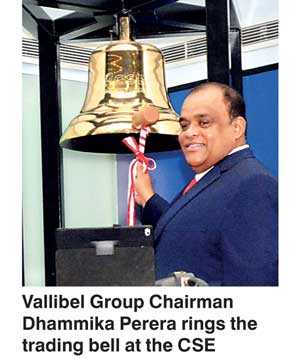Saturday Feb 14, 2026
Saturday Feb 14, 2026
Thursday, 5 July 2018 00:51 - - {{hitsCtrl.values.hits}}
By Charumini de Silva
Business tycoon and Vallibel One Chairman Dhammika Perera yesterday expressed confidence that the 5% population living in the city of Colombo will surpass $12,650 per capita income within the next three years, falling into the brackets of a ‘developed city.’ 
Addressing at the bell-ringing ceremony held at the Colombo Stock Exchange (CSE) to welcome the firm into Sri Lanka’s 20 largest listed entities, he pointed out that countries that surpass $12,650 per capita income are considered as developed cities, insisting Colombo will be on par with major regional cities such as Dubai, Singapore and Hong Kong by 2021.
However, Perera emphasised the importance of Government focus on conducting ‘district-focused’ development programs covering the balance 95% of the population in the country, noting that incapability of similar economic progress would lead to socio-economic issues.
“In Jaffna we have 28%, plus a 14% dividend tax and on top of that there is 38%. If we cannot give tax relief to parts like Jaffna, then how is the Government going to develop those areas? If the same kind of development is not achieved across the island, people will be unhappy. That lady’s (MP Vijayakala) statement in Jaffna has become a major issue, but we are also involved in the root cause of that. What will happen to those people if we don’t create employment in those areas?” he asked.
Noting that he often gets many requests to conduct lectures to Ordinary Level students in schools on career guidance opportunities, he reasoned that he was unable to do so as the socio-economic disparities in the rest of the districts are too wide to make a compelling story to a child’s mind.
“The facilities a student in Anuradhapura and Jaffna get are different. Hence, how are we going to convince them that those opportunities will be the same without having set examples? I think the best way to do so is to draw master plans focused on each district’s needs,” he added.
Perera said it was critical to have knowledge in a sector that interests a person to become a successful entrepreneur. “Most of the people in our country think that they are the experts of everything without absorbing knowledge from others,” he pointed out.
Declining to comment if he was satisfied with the public policies in Sri Lanka, as he was involved in policy making in the previous regime, he noted it was the community that should judge whether the outcome of those strategies was good or bad. Nevertheless, he asserted that Sri Lanka should also learn and absorb policies that support industries, like in the US, for businesses to come up with innovative products and services.
In terms of the tourism industry, Perera stressed that more liberalisation is required on the airline industry, particularly, budget airlines.
Citing Malaysia and Thailand as two major success stories in attracting 50% of budget airlines, he added the authorities must address these practical issues. “Sri Lanka has 90,000 rooms in total, but only 15,000-star class rooms; the balance 75,000 are non-star budget rooms. How are we going to serve those tourists? All are saying they need high-end travellers, but then how are we going to cater to this segment by having small hotels? These are some practical issues we need to sort out.”